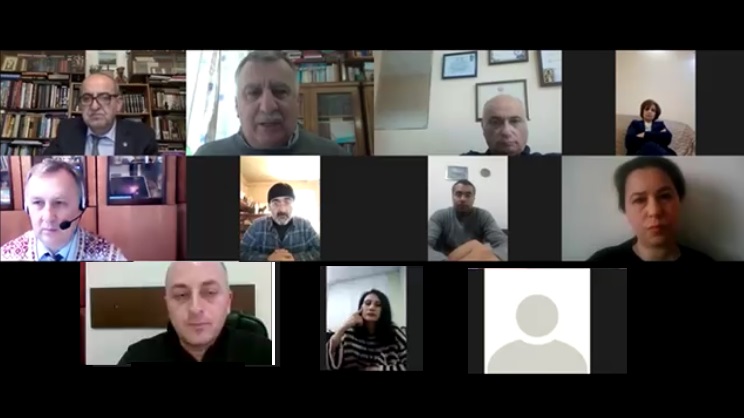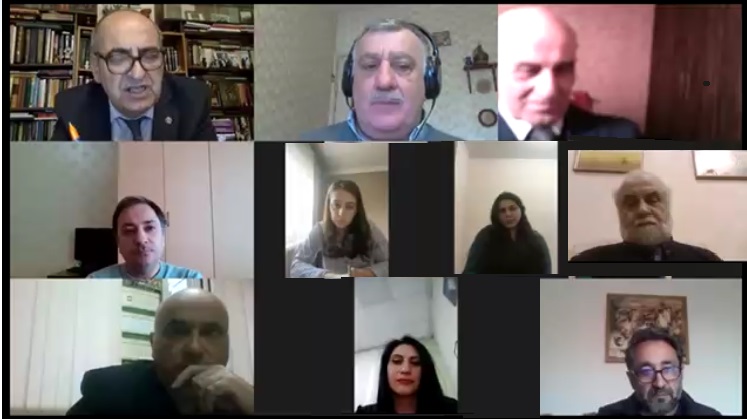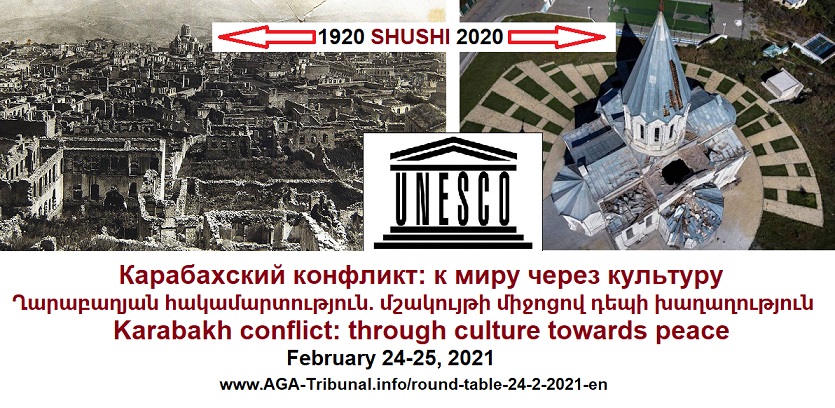in Russian – https://aga-tribunal.info/heritage-24-25-2-2021/
On February 24 and 25, 2021 the public organization “Crossroads” (“Khachmeruk”) organized the online round table “The Karabakh conflict: through culture towards peace”. The announcement was earlier on February 8 on the website, in social networks and in the mailing. The invitations were sent to the experts, who specialize in the cultural heritage of Artsakh.
The only way is – through consolidation
The event was timed to coincide with February 28 – the state Day of Remembrance for the victims of pogroms in Azerbaijan.
The round table was attended by 18 experts from seven cities of Russia, Armenia, Artsakh, Bulgaria. Among them were representatives of three state bodies: the Ministry of Culture of the Republic of Artsakh, the Office of the chief commissioner for Diaspora affairs of the Office of the prime minister of Armenia and the Armenian Genocide Museum-Institute. The vice-president of the International Center of the Roerichs and the head of the branch in Bulgaria also participated.
For the round table there was prepared a block of more than 130 references to various publications and documents of recent times on the cultural heritage of Artsakh, divided into several categories and presented in the announcement. These materials, previously scattered on various web resources, were posted on the trilingual site AGA-Tribunal.info, which contains more than 800 publications against the crimes of Azerbaijan.
From declarations to actions
This event is another step in the international movement for a full-fledged political and legal assessment of the crimes committed by Azerbaijan. In July 2020, an international conference was held to mark the 100th anniversary of the massacre of Armenians in Shushi in 1920. One of the outcomes was the intention to create a mixed working group. However, Azerbaijan’s treacherous attack on Artsakh, on the one hand, thwarted plans, and on the other hand, had further actualized the problem. To this was added the fact that even three months after the temporary ceasefire in November, there are no effective steps from UNESCO, which at one time also did not react to the flagrant crimes by Azerbaijan with the destruction of thousands of ancient khachkars (cross-stones) in Jugha. 60 subjects of 15 countries recognized the Republic of Artsakh, condemned the joint treacherous attack by Azerbaijan, Turkey and jihadist groups on Artsakh, including destruction of the Armenian cultural heritage. But there is no continuation of this protests in practice, there is no aftereffect of the many appeals of hundreds of cultural figures, scientists, religious organizations, there is no implementation in practice of dozens of appeals of the international community. Armenian Foreign minister Ara Ayvazyan spoke about this critically to the UN on February 22.
Khatchmeruk is Crossroads in Armenian
The public organization “Khachmeruk” (“Crossroads”) for several years has been consolidating experts, organizations, resources and efforts to expose the genocidal policy and crimes of the genocide committed by Azerbaijan, since 1918. There is some progress in this international movement for the recognition of the crimes of genocide and culturicide by Azerbaijan. In contrast to past years, this fact is being voiced more and more often. This is stated in the aforementioned speech of A. Ayvazyan. A new department is being created at the Armenian Genocide Museum-Institute. The National Assembly of the Republic of Artsakh recently adopted a corresponding Statement. The last treacherous war between a coalition of Azerbaijan and Turkey and their joint crimes against Artsakh and Armenians proved to those who hesitated earlier that the Armenian Genocide by Turkey and Azerbaijan is a single process. On the other hand, this topic is not an “internal Armenian issue” – it is an international issue.
In the near future, the participants of the round table will begin the implementation of the planned steps, and the public will be informed. One of the first concrete projects will be the publication and distribution in Russia of a brochure on the crimes of culturicide committed by Azerbaijan.
Participants of the round table:
Alexandr Manasyan, Ph.D. in philosophy, professor (Yerevan),
Martik Gasparyan, Academician of the Russian Academy of Arts, RANS, MADENM, WAEN (Moscow)

Oleg Gabrielyan, Doctor of Philosophy, Professor (Simferopol)
Melania Balayan, Advisor to the Minister of Education, Science, Culture and Sports of the Republic of Artsakh (Stepanakert)
Hovhannes Alexanian, Head of Strategic Research, Office of the Chief Commissioner for Diaspora Affairs, Office of the Prime Minister of Armenia (Yerevan)
Mary Gevorkyan, Public relations specialist, Genocide Scholar, Armenian Genocide Museum-Institute
Hovik Avanesov, Scientific researcher, Center for Caucasian Studies, Mesrop Mashtots University, member of the Public Council for Protection of Cultural Heritage “COHEP” (Stepanakert, Republic of Armenia)
Mihran Shakhzadeyan, political scientist, Doctor of Philosophy (Moscow)
Sergey Skorodumov, Vice President of the International Center of the Roerichs (Moscow)
Marga Kutsarova, Head of the Bulgarian branch of the International Center of the Roerichs, specialist in International Law in the field of protection of cultural heritage (Sofia, Bulgaria)

Arthur Gevorkyan, Director of the National park-museum of sculpture in Gyumri, Chairman of the NGO “Gyumri Cultural experimental center”, sculptor (Gyumri)
Albina Sukiasyan, Chairman of the regional public organization “Armenian cultural and educational society “Ararat” (Moscow)
Levon Beklaryan, Ph.D. in Physics and Mathematics, professor, chief researcher of CEMI RAS (Moscow)
Ksenia Brodatskaya, Head of the Library-Branch No. 10 of the Kalininsky District (Sankt-Petersburg)
Raffi Kortoshyan, RAA (Yerevan)
Harutyun Bagdasaryan, lawyer (Yerevan)
Mariam Hovsepyan, political scientist (Moscow)
Vahan Babakhanyan, public organization of sociological and political science initiatives “Crossroads” (“Khachmeruk”), member of the Coordinating council of Russian-Armenian organizations (Sankt-Petersburg)

3 thoughts on “Round table “The Karabakh conflict: through culture towards peace””